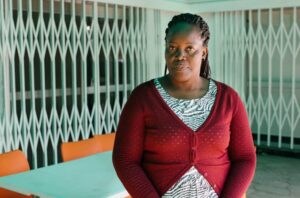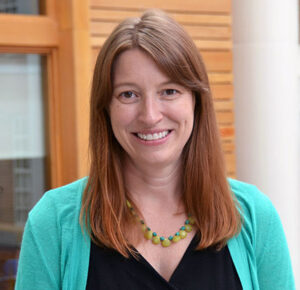Margaret Kasaro, MMed OBGYN, and others at the UNC School of Medicine and UNC Gillings School of Global Public Health have received a ~$3-million award from the Leona M. and Harry B. Helmsley Charitable Trust to improve access to portable ultrasounds in routine antenatal care in Zambia.

A new grant from the Leona M. and Harry B. Helmsley Charitable Trust will help Margaret Kasaro, MBChB, MSc, MMed OBGYN, research assistant professor of global women’s health in the UNC Department of Obstetrics and Gynecology, and other team members in their efforts to incorporate portable ultrasounds into antenatal care facilities throughout Zambia.
The handheld portable ultrasounds just require a regular phone or tablet for use.
“What we hope to do is show that these portable ultrasound devices, which do not require years of ultrasound training to learn to use, can expand services to areas with limited access,” said Kasaro. “We hope to produce evidence that will be useful to the Zambian government in any future scale up of this technology, particularly in areas with limited access, where women really need this service.”
The grant aims to help prepare for the type of scale up needed to achieve World Health Organization (WHO) antenatal care guidelines that every pregnant woman undergo at least one ultrasound examination in her antenatal period. The Zambian Minister of Health recently made a policy pronouncement and abolished user fees for ultrasound examination in Public Health facilities to promote early antenatal attendance by providing a free ultrasound scan.
There is very limited data about current levels of ultrasound coverage, but some studies indicate fewer than 5% of women receive any type of ultrasound during antenatal and labor and delivery care in this setting. The government is committed to closing this gap and portable ultrasound devices may be a solution to this problem.

For obstetricians, ultrasounds are an essential tool. Having an accurate gestational age of the pregnancy informs most decisions that need to be made to provide the best care, and may, for example, reduce the need for unnecessary interventions like labor induction. Low-cost handheld ultrasound technology and product development over recent years now offer the promise of greatly expanding access to ultrasounds and improving outcomes for mothers and babies worldwide.
Seeing the potential of these low-cost handheld ultrasounds, the UNC Global Women’s Health team has been working over the past five years to develop integrated tools to make them more accessible to nurses and midwives with no sonography training.
The Fetal Age Machine Learning Initiative (FAMLI), led by Jeffrey Stringer, MD, a professor of OBGYN at the UNC School of Medicine and the director of Global Women’s Health, has developed machine learning algorithms that can determine the gestational age and is developing additional guided assessments.
This new grant from the Helmsley Charitable Trust will extend this work by helping to understand how these tools can be successfully translated from the lab into the type of real-world settings where they are most needed.

A key component of any rollout of newer technologies will be the willingness of both providers and patients to incorporate them into routine antenatal care. Stephanie Martin, PhD, assistant professor of nutrition in the UNC Gillings School of Public Health, will be working with the team to examine the acceptability of these handheld ultrasound devices for both patients and providers.
“We want to understand their satisfaction with the device,” said Martin. “Did it feel comfortable for them? Did they enjoy the experience? Were there any aspects of it that made them feel uncomfortable?”
Media contacts:
- Meghan Palmer, MFA, Public Communications Specialist, Gillings School of Public Health
- Kendall Daniels, Communications Specialist, UNC Health | UNC School of Medicine